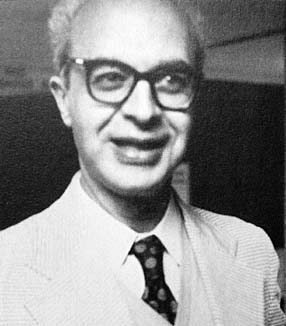
Georg Kreisel
 المؤلف:
P Odifeddi
المؤلف:
P Odifeddi
 المصدر:
Kreiseliana : About and around Georg Kreisel
المصدر:
Kreiseliana : About and around Georg Kreisel
 الجزء والصفحة:
...
الجزء والصفحة:
...
 22-1-2018
22-1-2018
 627
627
Born: 15 September 1923 in Graz, Austria

Georg Kreisel came from a Jewish background so growing up in Graz in the 1930s was very difficult. Kreisel's parents saw the approaching political problems and, before Hitler took over Austria, they sent Georg and his brother to England. Kreisel studied mathematics at Trinity College, Cambridge graduating with a B.A. in 1944. During his undergraduate years Kreisel was influenced by Wittgenstein who was also at Trinity. Wittgenstein said that Kreisel was:-
... the most able philosopher he had ever met who was also a mathematician.
Kreisel was sent to do War Service with the Admiralty immediately his university courses were over and he began work at West Leigh near Havant and close to the naval base at Portsmouth. The head of West Leigh at that time was Collingwood. After a while, Kreisel was moved to Fanum House in central London where he studied the effects of waves on the harbours which were being designed for the Normandy landings.
In 1946 Kreisel returned to Cambridge to undertake research, studying mathematical logic. After the award of his doctorate Kreisel hoped for a Fellowship at Trinity but this was not forthcoming. He applied for academic positions and was appointed to Reading in 1949. Freeman Dyson was an undergraduate at Cambridge in the same year as Kreisel and by the 1950s was at the Institute for Advanced Study. He persuaded Gödel to invite Kreisel to the Institute for Advanced Study and Kreisel arrived there in the summer of 1955. Verena Huber-Dyson writes in [1]:-
Although he did not come with the explicit intention of staying, and the possibility of return to Europe was open to him, Kreisel did not have strong ties to his position at Reading, a rather puzzling domicile for a person of his peculiar qualities.
Kreisel returned to Reading in 1957 but kept up a mathematically important correspondence with Gödel. In 1958-59 Kreisel was back in the United States, this time at Stanford. After returning to Reading for his last year on the staff there in 1959-60 he spent the two years 1960-62 in Paris.
In 1962 Kreisel returned to the United States and was appointed to Stanford where he remained on the staff until he retired in 1985.
S Feferman in [1] writes about Kreisel's contributions:-
Through his own contributions (individual and collaborative) and his extraordinary personal influence, Georg Kreisel did perhaps more than anyone else to promote the development of proof theory and the metamathematics of constructivity in the last forty years.
One important aspect which Kreisel worked on over a period of 30 years was his "unwinding". In 1958 in a paper Mathematical significance of consistency proof in 1958 Kreisel wrote:-
There is a different general program which does not seem to suffer the defects of [Hilbert's] consistency program: To determine the constructive (recursive) content or the constructive equivalent of the non-constructive concepts and theorems used in mathematics, particularly in arithmetic and analysis.
This "different general program" he later gave the more colourful name "unwinding program". As Feferman writes [1]:-
It aimed to substitute clear mathematical results for what were said to be vague, misplaced, crude foundational goals. But, as with his work on constructivity, Kreisel also sought to replace those by a more sophisticated stance about foundations.
Kreisel was elected a fellow of the Royal Society of London in 1966.
Books:
- P Odifeddi (ed.), Kreiseliana : About and around Georg Kreisel (Wellesley, Mass., 1996).
 الاكثر قراءة في 1920to1924
الاكثر قراءة في 1920to1924
 اخر الاخبار
اخر الاخبار
اخبار العتبة العباسية المقدسة


